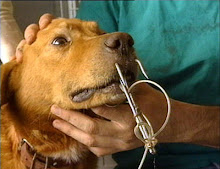ASPCA Announces Groundbreaking Research Study Underscoring Importance of Animal Cruelty Law Enforcement
Study Points to Lack of Resources, Funding, Training, & Recognizing LINK between Animal Cruelty & Human Violence
A groundbreaking research study just released by the ASPCA® (American Society for the Prevention of Cruelty to Animals®) stresses the critical role that animal services and animal cruelty investigations play in communities nationwide while pointing out the obstacles that law enforcement professionals face in responding to animal abuse.
Highlights from the ASPCA study, entitled "Public and Professional Perspectives on Animal Cruelty," reveal that only 19 percent of law enforcement officers stated they received formal animal cruelty training. Forty-one percent said they are familiar with animal cruelty laws in their jurisdiction, but fewer—30 percent—admitted being familiar with the penalties.
The study, taken from a nationwide sample of law enforcement professionals in the U.S., also defines the three major obstacles that law enforcement professionals face in responding to animal abuse cases: animal cruelty cases are considered a low priority by leadership; law enforcement lacks staff with special knowledge in animal cruelty cases; and finally, no facilities exist for long-term impoundment of animals kept as evidence.
"These findings validate what we have long assumed—that there is a major need for training for officers charged with enforcing animal cruelty laws and investigating cruelty cases," said Dr. Randall Lockwood, Senior Vice President of Forensic Sciences and Anti-Cruelty Projects for the ASPCA. "The ASPCA is unique in that we offer staff with specialized knowledge on this topic and have developed partnerships with shelters to help facilitate temporary housing for animals seized in such cases. We support local agencies across the U.S. with law enforcement training programs and other resources."
The city of Baltimore, for example, recently signed into law an Anti-Animal Abuse Advisory Commission, a board that works to help the city prevent and prosecute animal cruelty, including dogfighting. The commission was started at the ASPCA's behest as a task force in July 2009 following the fatal burning of a dog named Phoenix. Recommendations of the commission include training law enforcement and animal welfare professionals who respond to animal cruelty cases throughout Maryland and assisting in the drafting of anti-animal cruelty legislation.
In addition, the ASPCA, in conjunction with the U.S. Department of Justice's Community Oriented Policing Services (COPS) Office, has developed an in-depth, free on-line course on combating dogfighting and is developing a "dogfighting tool kit" for law enforcement and animal welfare professionals.
Another significant finding in the research study was that a majority of law enforcement officers surveyed--78 percent--believe that animal abusers are more likely to be involved in interpersonal violence or other violent crimes.
"The link between animal cruelty and human violence is well-documented and is a well-known phenomena among law enforcement," said Dr. Lockwood. "But animal cruelty training is still severely lacking in most cities, mostly due to a lack of resources and funding."
And in today's tough economy, animals are even more at risk. According to a content analysis conducted as part of this research study, media reports of animal abandonment, which is a form of animal cruelty, topped the news in the South Atlantic region of the U.S. from March to June of 2010. Incidentally, three states in the South Atlantic region (Georgia, Florida and Maryland), were included in RealtyTrac's highest foreclosure rate list for June 2010. Similarly high media reports of animal abandonment were seen in California, historically known as having a high foreclosure rate and ranked No. 4 in RealtyTrac's highest foreclosure rates for June 2010.
The ASPCA commissioned the six-month study, which was conducted from January through June 2010 by two market research firms: the Southeastern Institute of Research, Inc. (SIR) and Symscio. The research study probed three audiences: the general public, law enforcement officers and the media through focus groups, online surveys as well as a media content analysis. The online surveys included a nationwide sample of 1,200 respondents from the general population and 500 law enforcement respondents.
About the ASPCA®
Founded in 1866, the ASPCA® (The American Society for the Prevention of Cruelty to Animals®) is the first humane organization established in the Americas and serves as the nation's leading voice for animal welfare. One million supporters strong, the ASPCA's mission is to provide effective means for the prevention of cruelty to animals throughout the United States. As a 501 (c)(3) not-for-profit corporation, the ASPCA is a national leader in the areas of anti-cruelty, community outreach and animal health services. The ASPCA, which is headquartered in New York City, offers a wide range of programs, including a mobile clinic outreach initiative, its own humane law enforcement team, and a groundbreaking veterinary forensics team and mobile animal CSI unit. For more information, please visit www.aspca.org.
To become a fan of the ASPCA on Facebook, go to http://www.facebook.com/aspca. To follow the ASPCA on Twitter, go to http://www.twitter.com/aspca.
Wednesday, December 15, 2010
Subscribe to:
Post Comments (Atom)




No comments:
Post a Comment